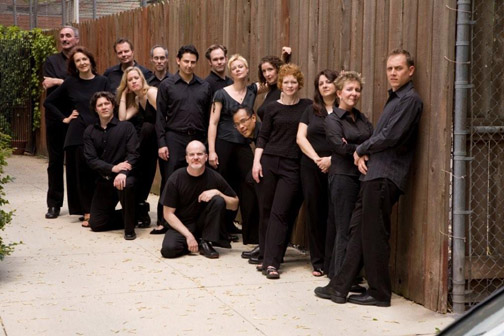Bella Voce mixes music of Tudors and today in stimulating program

The a capella group Bella Voce, led by Andrew Lewis, opened its season last night at Rockefeller Chapel with a demanding and rewarding program of seldom-heard English Tudor music interspersed with works by Gabriel Jackson, a contemporary choral composer heavily influenced by the Tudors. This is not the sort of concert that attracts big crowds, which is a shame, because the music is beautiful and stimulating, and was performed with accuracy and grace.
The program began fittingly with Jackson’s setting of William Blake’s poem To Morning, which gave dramatic polyphonic expression to the poet’s words: Awake the dawn that sleeps in Heaven; let light / Rise from the chambers of the East, and bring / The honey’d dew that cometh on waking day / O radiant morning ….
The stirring opening gave way to the rich extended meditation by Tudor composer John Browne, O Maria salvatoris. The piece allowed the twenty-four piece ensemble to shine, as it alternated between solo duets and trios, building to multiple solo lines that were not only complex harmonically but rhythmically, with several two-against-three passages. For all its complexity, the work came off as a cohesive whole under Lewis’s direction — celebratory but gentle and peaceful.
This was followed by another Jackson work, Cecilia Virgo, in which the group literally sang the praises of the patron saint of musicians and church music with a lovely chordal wash spiked with dramatic invocations of her name.
The Bella Voce singers rose to the challenge of the devilishly complex motet by the 16th century Scottish composer Robert Carver, O bone Jesu, and gave the last word of the first half to Jackson, with his Hymn to the Trinity, a celebratory work graced with syncopation and sudden modulations.
The second half featured two works by the great English Tudor composer Thomas Tallis, Loquebantur varlis linguis and Miserere nostri, which were performed radiantly by the group, as well as three additional Jackson numbers.
The final work on the program, Jackson’s beautiful setting of the Richard George Elliott poem Lux mortuorum, was a highlight. Jackson cites the influence of Stravinsky in his work, which was evident in this piece, which featured sustained dissonances that gave voice to the poem’s haunting meditation upon the “Luminous souls of the dead.” Just as the concert opened fittingly with a tribute to the dawn, it ended appropriately on an extended melisma on the word “dead” that did not want to end.
The program will be repeated 3 p.m. Sunday at Glenview Community Church, and 7:30 p.m. Oct. 23 at Grace Lutheran Church in River Forest. bellavoce.org; 312-479-1096.
Posted in Performances


